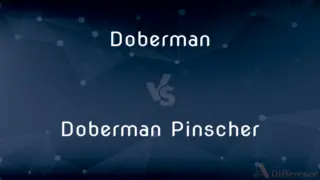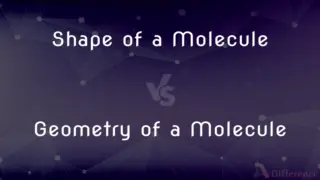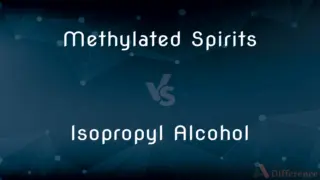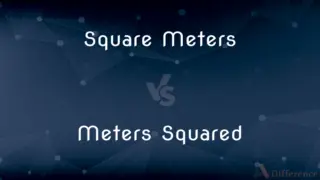Topic vs. Heading — What's the Difference?
By Fiza Rafique & Maham Liaqat — Updated on March 16, 2024
A topic encapsulates the overall subject or idea of a discourse, while a heading serves as a title or label for specific sections within that discourse.

Difference Between Topic and Heading
Table of Contents
ADVERTISEMENT
Key Differences
A topic is a broad subject area under discussion or study, defining the general theme or content. For instance, in an essay, the topic might be "Environmental Conservation." On the other hand, a heading is more specific, used to title subsections of a document or article, such as "Impact of Plastic Pollution."
While a topic provides a wide framework and sets the direction for a piece of writing or conversation, headings help organize the content into manageable sections, guiding the reader through the details.
Topics often require extensive exploration and can cover a wide range of content, whereas headings are concise, focusing on a particular aspect or point within the broader topic.
In academic or professional writing, the topic reflects the overall scope of research or discussion, while headings break down the topic into smaller, focused areas for detailed examination.
While a topic can be abstract and open to interpretation, headings are usually straightforward, aiming to clearly inform the reader about the content that follows.
ADVERTISEMENT
Comparison Chart
Scope
Broad, covering a general subject
Specific, detailing subsections
Function
Sets the overall direction
Organizes content into sections
Content Coverage
Extensive, wide-ranging
Focused, on a particular aspect
Location
Discussed at the beginning
Used throughout the document
Interpretation
Can be abstract
Straightforward, less open to interpretation
Compare with Definitions
Topic
A topic is the overarching subject that a piece of writing, conversation, or study is about.
The topic of the seminar was climate change.
Heading
Headings are titles or labels used for sections within a document to organize content.
The first heading in her thesis was Literature Review.
Topic
The topic sets the foundation and direction for the entire discussion.
The meeting's topic was set to address the upcoming project challenges.
Heading
Each heading focuses on a specific aspect or point within the broader topic.
The article included a heading about the effects of deforestation on biodiversity.
Topic
The topic guides the overall content and structure of the work.
The book's topic was the history of the Renaissance.
Heading
Headings serve as an organizational tool to guide the reader through the document.
He used descriptive headings to make the report easier to navigate.
Topic
A topic can be more abstract, leaving room for various interpretations and angles.
The documentary's topic explored the concept of freedom.
Heading
Headings are structural elements that break down complex topics into manageable sections.
Each heading in the guidebook introduced a new travel destination.
Topic
Topics encompass a wide range of content related to the subject.
Her research topic included various aspects of sustainable development.
Heading
Headings are usually concise and aim to be direct about the content that follows.
The chapter's heading was The Rise of Digital Currencies.
Topic
The subject of a speech, essay, thesis, or discourse.
Heading
A title at the head of a page or section of a book
Chapter headings
Topic
A subject of discussion or conversation.
Heading
A direction or bearing
He crawled on a heading of 90 degrees until he came to the track
Topic
A subdivision of a theme, thesis, or outline.
Heading
A horizontal passage made in preparation for building a tunnel.
Topic
(Linguistics) A word or phrase in a sentence, usually providing information from previous discourse or shared knowledge, that the rest of the sentence elaborates or comments on. Also called theme.
Heading
A strip of cloth at the top of a curtain above the hooks or wire by which it is suspended.
Topic
Topical
Heading
The title, subtitle, or topic that stands at the top or beginning, as of a paragraph, letter, or chapter.
Topic
Subject; theme; a category or general area of interest.
A society where a topic cannot be discussed, does not have free speech.
Stick to the topic
An interesting topic of conversation
Romance is a topic that frequently comes up in conversation
Heading
The course or direction in which a ship or aircraft is pointing or moving.
Topic
(Internet) Discussion thread.
Heading
A gallery or drift in a mine.
Topic
(music) A musical sign intended to suggest a particular style or genre.
Heading
The end of a gallery or drift.
Topic
(obsolete) An argument or reason.
Heading
Present participle of head
Topic
An external local application or remedy, such as a plaster, a blister, etc.
Heading
The title or topic of a document, article, chapter, or of a section thereof.
Put the information under the "Advantages" heading
Topic
One of the various general forms of argument employed in probable as distinguished from demonstrative reasoning, - denominated by Aristotle to`poi (literally, places), as being the places or sources from which arguments may be derived, or to which they may be referred; also, a prepared form of argument, applicable to a great variety of cases, with a supply of which the ancient rhetoricians and orators provided themselves; a commonplace of argument or oratory.
These topics, or loci, were no other than general ideas applicable to a great many different subjects, which the orator was directed to consult.
In this question by [reason] I do not mean a distinct topic, but a transcendent that runs through all topics.
Heading
(nautical) The direction into which a seagoing or airborne vessel's bow is pointing (apparent heading) and/or the direction into which it is actually moving relative to the ground (true heading)
Topic
An argument or reason.
Contumacious persons, who are not to be fixed by any principles, whom no topics can work upon.
Heading
Material for the heads of casks, barrels, etc.
Topic
The subject of any distinct portion of a discourse, or argument, or literary composition; also, the general or main subject of the whole; a matter treated of; a subject, as of conversation or of thought; a matter; a point; a head.
Heading
(mining) A gallery, drift, or adit in a mine; also, the end of a drift or gallery; the vein above a drift.
Topic
An external local application or remedy, as a plaster, a blister, etc.
Heading
(sewing) The extension of a line ruffling above the line of stitch.
Topic
Topical.
Heading
(masonry) The end of a stone or brick which is presented outward.
Topic
The subject matter of a conversation or discussion;
He didn't want to discuss that subject
It was a very sensitive topic
His letters were always on the theme of love
Heading
(flags) A strip of material at the hoist end of a flag, used for attaching the flag to its halyard.
Topic
Some situation or event that is thought about;
He kept drifting off the topic
He had been thinking about the subject for several years
It is a matter for the police
Heading
The act or state of one who, or that which, heads; formation of a head.
Heading
That which stands at the head; title; as, the heading of a paper.
Heading
Material for the heads of casks, barrels, etc.
Heading
A gallery, drift, or adit in a mine; the vein above a drift.
Heading
The extension of a line ruffling above the line of stitch.
Heading
That end of a stone or brick which is presented outward.
Heading
A line of text serving to indicate what the passage below it is about;
The heading seemed to have little to do with the text
Heading
The direction or path along which something moves or along which it lies
Heading
A horizontal (or nearly horizontal) passageway in a mine;
They dug a drift parallel with the vein
Common Curiosities
How broad is a topic compared to a heading?
A topic has a broader scope, covering the general subject area, whereas a heading is more specific, focusing on a particular aspect of that subject.
What is the primary purpose of a topic?
The primary purpose of a topic is to define the overall subject or theme being discussed, studied, or written about.
How do headings help in reading or writing a document?
Headings help organize the document into sections, making it easier for readers to navigate and understand the content.
Can a heading be considered a topic?
A heading can represent a specific topic within the broader main topic but is generally more focused and serves as a subsection title.
Are headings necessary in all types of writing?
Not all types of writing require headings, but they are helpful in longer, more complex documents for organizational purposes.
Can there be multiple topics in one document?
While a document generally revolves around one main topic, it can include several subtopics, each potentially under its own heading.
Is it possible for a topic to change within a document?
The main topic usually remains consistent, but the document can explore various aspects or subtopics related to it.
Do headings contribute to the overall theme of a document?
Yes, headings contribute by breaking down the theme into detailed sections, making the document's structure and flow clearer.
How does one choose a heading for a section?
A heading is chosen based on the specific content and focus of the section it introduces, summarizing the main point or idea.
How does one transition from one heading to another in writing?
Transitioning between headings involves concluding the current section and introducing the next, ensuring a smooth flow of ideas.
Can a topic be too broad for effective discussion?
Yes, if a topic is too broad, it may need to be narrowed down to ensure focused and effective discussion or writing.
How does one identify the topic of a discussion or document?
The topic can usually be identified by the title, introduction, or overall content and direction of the discussion or document.
What role do headings play in digital content?
In digital content, headings also help with SEO (Search Engine Optimization) by highlighting key points and improving readability.
Are headings used differently in academic writing compared to other forms of writing?
In academic writing, headings are often used more systematically, following specific formatting guidelines to structure complex information.
How does the choice of headings affect the reader's understanding of the topic?
Well-chosen headings clearly outline the document's structure, guiding the reader through the topic's different aspects for better understanding.
Share Your Discovery

Previous Comparison
Guernsey vs. Ayrshire
Next Comparison
Semester vs. TrimesterAuthor Spotlight
Written by
Fiza RafiqueFiza Rafique is a skilled content writer at AskDifference.com, where she meticulously refines and enhances written pieces. Drawing from her vast editorial expertise, Fiza ensures clarity, accuracy, and precision in every article. Passionate about language, she continually seeks to elevate the quality of content for readers worldwide.
Co-written by
Maham Liaqat














































